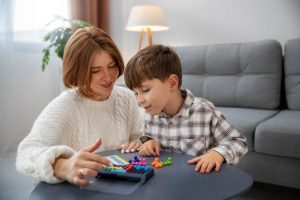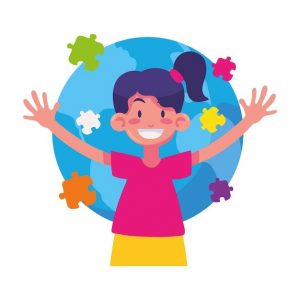Boosting Emotional Expression in Kids with Online Platforms
Last Updated: February 10, 2025
Imagine a world where your child can express their feelings clearly, understand their emotions, and communicate them effectively. Emotional expression is not just about letting out a cry or laugh; it’s a fundamental part of a child’s growth. When children learn to express their emotions, they build strong foundations for healthy relationships, resilience, and mental well-being. It’s like giving them the tools to navigate life’s challenges with confidence. But in today’s fast-paced digital age, where face-to-face interactions are sometimes limited, how do we ensure our children are developing these essential emotional skills?
Understanding Emotional Expression in Children
Definition and Importance
Emotional expression in children is more than just a response to their environment; it’s a vital component of their overall development. Simply put, emotional expression is the ability of a child to communicate their feelings, whether it’s joy, sadness, anger, or fear. This expression can take various forms, such as verbal communication, body language, facial expressions, or even creative outlets like drawing or playing.
Why is this so important? When kids can express their emotions well, they can handle stress better, build healthy relationships, and understand themselves more. Being able to share their feelings is the first step toward emotional intelligence, which is important for dealing with life’s challenges. For example, a child who can say when they are upset is more likely to get the help they need, which can prevent problems like behavioral issues or anxiety from building up.
Challenges in Emotional Expression
However, the path to healthy emotional expression isn’t always smooth, especially in today’s digital age. One of the significant challenges children face is the reduced opportunity for face-to-face interactions, which are essential for learning and mimicking emotional cues. With increased screen time and less physical interaction, children might find it challenging to pick up on subtle emotional signals or practice expressing their feelings in a social context.
Another challenge is the overwhelming amount of digital content that children are exposed to. While some of this content can be educational, much of it can be overstimulating or even emotionally numbing, making it harder for kids to process and express their own feelings. Additionally, the pressure to conform to the idealized images and behaviors seen on social media can hinder a child’s ability to express genuine emotions, leading to frustration or low self-esteem.
The Role of Online Platforms in Emotional Development
Accessibility and Engagement
In today’s digital world, online platforms have changed how we teach kids about emotions. One big benefit of these platforms is how easy they are to access. Unlike traditional methods that might need in-person sessions or special materials, online platforms can be used anywhere and anytime. This flexibility allows kids to learn about emotions at their own pace, whether they are at home, during a school break, or even on the go.
These online tools are also designed to be fun and engaging. With colorful designs, interactive features, and content that’s just right for their age, these platforms grab kids’ attention and make learning about emotions enjoyable. By making emotional education exciting, these platforms encourage kids to participate and explore their feelings in ways that might not be possible in a regular classroom or therapy setting.
Variety of Tools
Online platforms offer a diverse range of tools tailored to help children express their emotions. These tools include apps that allow kids to track their moods, games that teach empathy and emotional recognition, and interactive programs where children can role-play different scenarios to understand various emotions. For instance, mood-tracking apps often use visual aids, like emotions or color-coded charts, to help children identify and express how they feel. This simple yet effective approach enables kids to monitor their emotions over time, fostering self-awareness.
Interactive games and storytelling apps are another excellent resource, offering scenarios where children can practice responding to different emotional situations. These games often include challenges or rewards that make learning about emotions more engaging and memorable. Additionally, virtual therapy platforms provide a safe space for children to express their emotions with the guidance of a professional, making emotional development more accessible to those who may not have easy access to in-person therapy.
Personalization and Adaptability
One of the best things about online platforms is that they can be personalized to fit each child’s unique needs. Every child is different, so their emotional development should be too. Online platforms often have features that let parents, teachers, or therapists adjust the experience for each child. For example, some apps allow you to change the difficulty of games or choose specific emotions to work on. This way, the content stays relevant and challenging without being too hard or overwhelming.
How to Effectively Use Online Platforms to Enhance Emotional Expression
Parental Involvement
When it comes to boosting emotional expression in children through online platforms, parental involvement is crucial. While these tools can be incredibly effective, their impact is significantly amplified when parents are actively engaged. Parents can guide their children in choosing the right apps or programs, monitor their usage, and ensure that the content is age-appropriate. More importantly, parents can help children reflect on what they’ve learned, facilitating discussions that reinforce the emotional lessons taught by these platforms.
Integration with Daily Life
To truly benefit from online platforms, it’s essential to integrate these tools into your child’s daily routine. Emotional learning shouldn’t be seen as a separate activity but rather as a continuous process that is woven into everyday life. Start by setting aside specific times during the day for using these platforms.
Incorporating these tools into regular activities makes emotional learning a natural part of your child’s life, rather than something they do only when reminded. Over time, this consistency helps children develop strong emotional habits, making it easier for them to express and manage their feelings in various situations.
Read more: Emotional Regulation for Kids: Easy Tips and Activities
Encouraging Open Communication
Online platforms can also be powerful tools for fostering open communication between parents and children. While these platforms offer valuable learning experiences, they should be used alongside traditional methods of communication to maximize their benefits. After your child engages with an online tool, initiate a conversation about their experience. Ask open-ended questions like, “What did you learn today?” or “How did that make you feel?”
Potential Challenges and How to Overcome Them
Screen Time Concerns
In today’s digital age, one of the most common concerns for parents is the amount of screen time their children are exposed to. While online platforms can be incredibly effective for boosting emotional expression, it’s important to strike a balance between screen time and offline activities. Too much screen time can lead to issues such as eye strain, sleep disturbances, and reduced physical activity.
To overcome this challenge, consider setting clear boundaries on how much time your child spends on these platforms. For example, you might limit screen time to 30 minutes a day specifically dedicated to emotional learning apps. Additionally, complement online activities with offline emotional learning, such as family discussions, creative play, or outdoor activities that encourage emotional expression. This balanced approach ensures that your child benefits from both digital and real-world interactions, leading to a more well-rounded emotional development.
Privacy and Security
Another critical concern is the privacy and security of the online platforms your child uses. Since many of these platforms require personal information or track user activity, ensuring your child’s data is protected is paramount. The last thing any parent wants is for their child’s sensitive information to be compromised.
To mitigate this risk, always choose platforms that prioritize privacy and have robust security measures in place. Look for apps and websites that are certified by reputable organizations and offer clear privacy policies. It’s also a good idea to regularly review the app’s settings and monitor what information is being shared. By being proactive about privacy, you can provide a safe online environment where your child can explore and express their emotions without any security concerns.
Over-reliance on Technology
While online platforms offer valuable tools for emotional learning, there’s a risk of becoming overly reliant on technology. If children spend too much time on these platforms, they might miss out on essential face-to-face interactions and other real-life experiences that are crucial for emotional development.
To prevent over-reliance on digital tools, it’s essential to encourage a balanced approach. Online platforms should be used as a supplement to, not a replacement for, traditional methods of emotional learning. For instance, after your child uses a mood-tracking app, encourage them to discuss their feelings with you or engage in activities like drawing or storytelling to express their emotions in different ways. By integrating both online and offline methods, you can ensure that your child develops a healthy and balanced emotional toolkit.
Conclusion
Boosting emotional expression is key for children’s growth, helping them understand their feelings and build relationships. Online tools like mood trackers and storytelling apps are great for this, but it’s important to balance screen time and ensure safety. At Wellness Hub, we support your child’s emotional development with various resources. Explore our tools and see how we can help at Wellness Hub Emotional Learning Resources. Start enhancing your child’s emotional skills today!
Frequently Asked Questions:
1. What are the best online platforms for boosting emotional expression in children?
There are several online platforms designed to help children express their emotions effectively. Some of the best include MoodMeter for mood tracking, Breathe, Think, Do with Sesame for emotional regulation, Smiling Mind for mindfulness, and Emotionary for interactive storytelling. These tools are engaging and can be integrated into your child’s daily routine to enhance their emotional development.
2. How can parents help their children use online tools to express emotions?
Parents can support their children by guiding them in choosing the right online platforms, monitoring their usage, and discussing their feelings after using the tools. Combining these digital activities with offline emotional learning and regular conversations can help children better understand and express their emotions.
3. What are the potential challenges of using online platforms for emotional learning?
Some challenges include concerns about screen time, privacy, and the risk of over-reliance on technology. It’s important to balance online activities with offline emotional learning, choose secure platforms, and ensure that children do not become overly dependent on digital tools for expressing their emotions.
4. How do I balance screen time with offline emotional activities for my child?
To balance screen time, set clear limits on how much time your child spends on online platforms each day. Complement this with offline activities such as family discussions, creative play, and outdoor experiences that encourage emotional expression. This helps ensure that your child develops a well-rounded approach to emotional learning.
5. Are online platforms safe for children to use for emotional expression?
Yes, online platforms can be safe for children if you choose those with strong privacy and security measures. Always review the app’s privacy policies, monitor your child’s activity, and ensure that the platform is age-appropriate. This helps create a secure environment where your child can explore and express their emotions safely.
6. Can online platforms replace traditional methods of emotional learning?
Online platforms are helpful tools, but they should not replace traditional methods of emotional learning. These platforms can make learning about emotions more fun and interactive, but it’s important to use them alongside real-life interactions and activities. This way, children can develop their emotional skills in a balanced and healthy way.
7. How can I encourage my child to talk about their emotions using online tools?
After your child uses an online tool for emotional expression, encourage them to talk about what they experienced. Ask open-ended questions like, “What did you learn?” or “How did that make you feel?” This helps reinforce the lessons learned online and promotes open communication about their emotions.
8. What are the benefits of using online platforms for emotional development in children?
Online platforms offer several benefits for emotional development, including accessibility, engagement, and the ability to personalize learning experiences. These tools can help children understand and express their emotions in a fun and interactive way, making emotional learning a more engaging and continuous process.
9. How do I choose the right online platform for my child’s emotional development?
When choosing an online platform, consider your child’s age, interests, and emotional needs. Look for tools that are engaging, age-appropriate, and have strong privacy protections. It’s also helpful to read reviews and try out the platform yourself to ensure it meets your expectations.
10. How can Wellness Hub help with my child’s emotional learning journey?
Wellness Hub offers a range of resources and services to support your child’s emotional well-being. From expert advice to online tools, we provide the guidance you need to help your child develop strong emotional skills. Visit our website to explore how we can assist you in nurturing your child’s emotional growth.
About Author:
Lasya Vooturi,
Clinical Psychologist (A) & Behavioral Therapist
Lasya holds a Professional Diploma in Clinical Psychology from Amity University, where she deepened her understanding of psychological principles from March 2023 to March 2024. With over a year of dedicated experience as a Behavioral Therapist, Lasya has honed her skills in applying effective therapy techniques tailored to individual needs. Fluent in Telugu, Hindi, and English, she is adept at connecting with a diverse range of clients, ensuring comprehensive communication and understanding. Lasya’s approach is grounded in empathy and scientific rigor, making her a trusted ally in navigating mental health challenges.
Book your Free Consultation Today
Parent/Caregiver Info:
Client’s Details:
* Error Message









